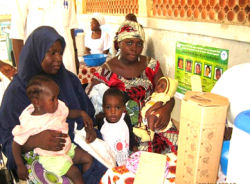Targeted States High Impact Project (TSHIP)
 |
| Patients awaiting treatment at USAID supported Bayara General Hospital, Bauchi, Nigeria. Photography by Jide Adeniyi-Jones |
TSHIP is USAID/Nigeria’s flagship Health, Population, and Nutrition project being implemented in the focus States of Bauchi and Sokoto. The project is an integrated maternal neonatal and child health initiative that uses high impact and low cost interventions to reduce maternal and child deaths.
The project is designed to strengthen the Nigerian health sector and improve the country’s health indicators, two of the most important development issues facing Nigeria. Maternal mortality rates are very high, particularly in the northern states. The average woman in those states, where childbearing starts very early and births are very closely spaced, gives birth to seven children during her reproductive years. Though child mortality has declined slightly over the past five years, nearly 16% of children born in Nigeria will die before reaching their fifth birthday. This is due in large part from highly preventable causes such as malaria, respiratory infections, diarrhea, and measles. Furthermore, more than 10 million children under five suffer from chronic malnutrition. Child mortality and malnutrition rates are far higher in Nigeria’s two northernmost geopolitical zones than in other parts of the country, and Nigeria is the only country in Africa never to have interrupted the transmission of the polio virus.
Targeted States High Impact Project (TSHIP) Strategy:
TSHIP is designed to support Bauchi and Sokoto States to achieve the Millennium Development Goals of reducing maternal and child mortality by half by 2015. The project builds health systems to effectively deliver primary health care and strengthens community based groups, such as ward development committees, and community based organizations, including religious groups, enabling them to be more responsive to the basic health services of members of their communities, especially women and children. The project will also support overall improvement of the primary health care delivery system through building capacity and institutional strengthening, including the ability of households to protect and promote their own health. Key activities include integrated community and facility-based essential maternal/newborn care with interventions focusing on antenatal care, emergency obstetric care and newborn care, postpartum care, and family planning for healthy timing and spacing of pregnancies; and prevention and treatment of obstetric complications and disabilities, including prevention, treatment, and repair of obstetric fistula.
TSHIP focuses on a “continuum of care” model, designed to address the comprehensive health needs of mother and child. As the core principle in integrated maternal, neonatal, and child health services, the range of care is built on the capacity of the health provider to address the holistic health care needs of the family as a package linked to treating a child’s acute fever; providing routine immunization; nutrition support including exclusive breast feeding and Vitamin A distribution; malaria prevention and treatment; diarrhea prevention and case management; ante-natal care; child spacing; and other low-cost high-impact maternal and child heath care interventions. Through activities of the project, health workers will be better prepared to provide integrated care, including prompt referrals to maternity centers and secondary or tertiary hospitals as appropriate.
TSHIP collaborates with states and other partners in implementing new policies through advocacy, capacity building, and behavioral change communication interventions. It will also provide support for successful implementation of international and national initiatives such as polio eradication and child health week at the state level.
Program Snapshot:
• Project Name: Targeted States High Impact Project
• Life of Project: 2009 – 2014
• Funding: $85,453,015
• Implementing Partner: JSI Research & Training Institute, Inc.
• Geographic Focus: Bauchi and Sokoto States
Expected Results:
• Strengthened state and local government capacity to deliver and promote use of high impact family planning / reproductive health / maternal and child health (FP/RH/MCH) interventions
• Strengthened delivery and promotion of high impact FP/RH/MCH interventions at PHC and essential referral levels
• Strengthened the roles of households and communities in promotion, practice, and delivery of high impact FP/RH/MCH interventions
• Improved policies, programming, and resource allocation at state and federal levels

